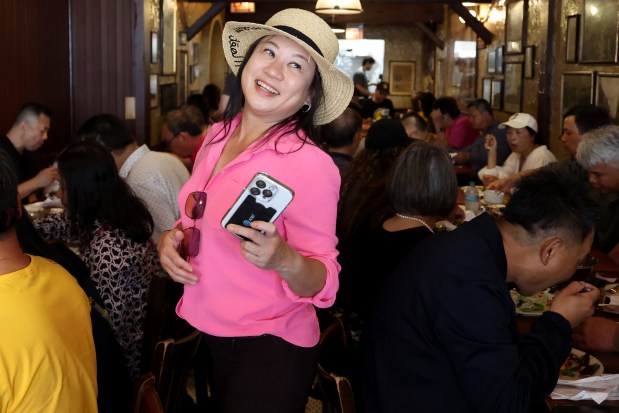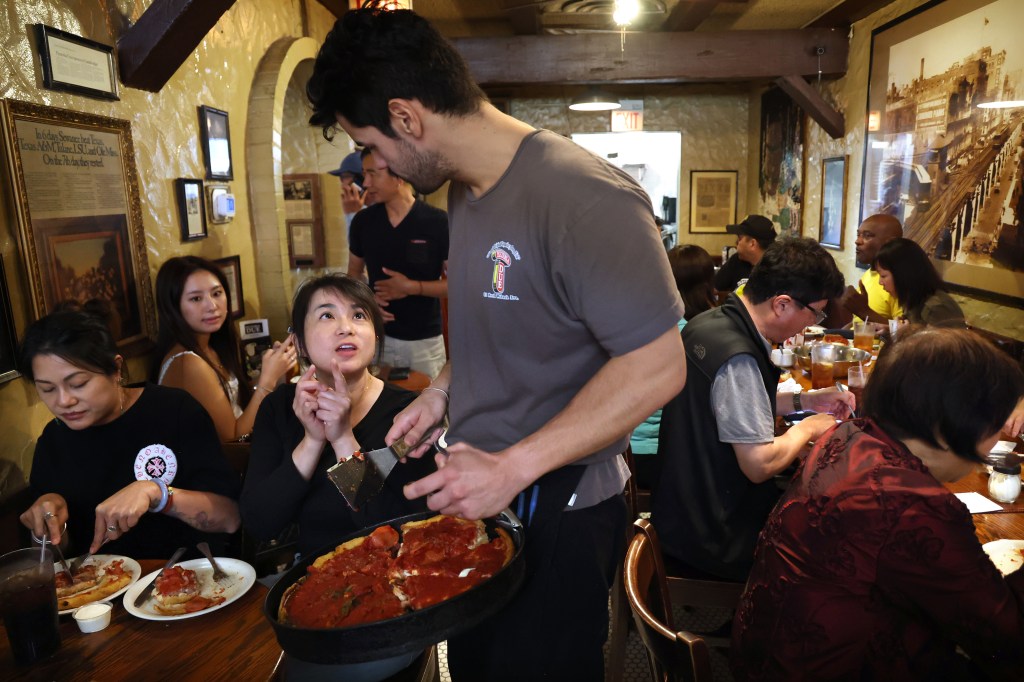Knife and fork in hand, Cassie Lin sliced off a corner of her pizza — packed with thick layers of mozzarella, mushrooms and pepperoni — and took a bite. A visitor from Texas, it’s Lin’s first time trying Chicago deep dish. Her reaction was mixed.
“It’s very good,” Lin said in between bites, covering her mouth with her hand. “It’s very cheesy, very meaty.”
Another bite. She chewed it over.
“Is it too late to say I’m lactose intolerant?” asked Lin.
Lin, 18, is a college student from the Houston area and she’s no ordinary tourist. She was here with her mom, aunt, uncle and cousin as part of the first organized, large-sized gathering in Chicago of immigrants and their descendants from the Fujian province of China.
Known as Fujian hometown associations, at least a dozen such groups from across North America gathered in and around Streeterville over the past week to participate in the convention, which was made up largely of tourist activities, showcasing the best of what the city has to offer, and culminating with a gala Thursday night at Navy Pier.
Nearly 100 people came together to celebrate shared culture and brainstorm ways to stay connected as a community.
For Dr. Kim K. Tee, 61, an organizer of this week’s convention, the event was a great way for different associations to join forces and strategize about recruitment. Tee was also excited to introduce visitors to his home of more than 40 years, he said.
“I want to show them not only Chicago, but culturally what Chicago has to offer,” said Tee, who lives in South Loop.
That had to, of course, include the deep-dish pizza that Lin did not fully finish (in her defense, she’s not a pizza fan overall, she said). Still, Thursday’s lunch — in a bustling room at Pizzeria Due in Streeterville filled with the sounds of Mandarin Chinese, Hokkien, Cantonese and English — was an experience that helped Lin learn more about new cultures and old communities.
“Everyone’s here to talk about their stories — talk about their successes, their failures, how their business ventures went left or right,” said Lin, born in the U.S. to a Fujianese dad and Vietnamese Fujianese mom. “It’s just all stories about moving to America and becoming something more than themselves.”
Home away from home
Fujian is a coastal province in southeast China with a population of about 42 million people. For centuries, Fujianese people emigrated to Taiwan and Southeast Asia, bringing a group of Chinese languages, Hokkien, throughout the region.
Many of their descendants eventually made their way to the United States, especially starting in the 1960s as people tried to escape the Vietnam War. Tee said they settled in New York and other big cities. In Chicago, they often joined the Asian community in the Uptown neighborhood.
And in the 1980s, after the U.S. and Communist China resumed diplomatic relations, a wave of Fujianese from mainland China also immigrated to the U.S., where a mishmash of shared geography, culture, nationality and language bound them together.
Johnny Zheng, 63, founded the Chicago-based American Fu Jian Business Association about 10 years ago. He said it’s hard to know exactly how many Fujianese people live in the Chicago area. His best estimate, as a long-standing community leader, is between 20,000-30,000 in the Midwest. About 10,000 Fujianese live in the Chicago area, he and other leaders said.
In total, there were at least 92,000 people who speak Chinese as their household language in the Chicago metropolitan area in 2019-2023, according to the Chicago Metropolitan Agency for Planning.
Outside of the New York metropolitan area, Zheng added, Chicagoland has one of the biggest Fujianese diaspora in the United States.
While overall Chinese immigration to the U.S. has largely increased for the last few years, Tee and Zheng said they’ve noticed less engagement between young people and existing Fujianese community groups. That’s why conventions like this week’s are so important, said Catherine Wang, outgoing president of the Chicago Fujian Association.
“It’s very hard to get young people to come forward,” said Wang, who is Malaysian Fujianese. “That’s why we were deciding to all come together to discuss and see how to keep the organization alive.”
But 20-year-old Lucas Wang, Catherine Wang’s son, said it’s become less important for members of the Chinese diaspora to reach back to their distant heritage.
Born in the U.S., he identifies more with his Malaysian than Fujianese background, even though he learned Mandarin in Chicago Public Schools, Lucas Wang said. At the gala dinner, he was one of few attendees under 30, helping check in guests.
While he respects the culture, Lucas Wang said it would feel “artificial” to force himself into the Fujianese community.
“It kind of reminds me of people that want to ‘embrace their culture’ for college applications and then get into a good college,” Lucas Wang added.
For older generations to succeed in keeping young people connected to their Fujianese heritage, Lucas Wang suggested more cultural immersion programs like visiting ancestral hometowns in Fujian. He’s never been to China before, but took biannual trips to Malaysia before the pandemic, he said.
One strategy Catherine Wang said became more important to her during this week’s convention is starting cultural education young. Parents should teach their children about Fujian-specific traditions, she said.
“Chinese New Year, what do Fukienese do? We need to have gānzhè, sugarcane,” Catherine Wang said. “We tell them, ‘Do you know why we put these two sticks next to the door?’ Because Fujian culture: We were saved from World War II because we were hiding in the sugarcane forest.”
Hometown associations, like the Chicago Fujian Association Tee used to lead, have long served as important social groups for Chinese immigrants looking for community in the U.S. They generally form on the basis of a shared city, province or region of origin. There are at least a dozen Chinese hometown associations active in the Midwest, most based in Chicago.
Tee arrived in the U.S. in the 1980s to study as a 19-year-old from a “very poor family” in Malaysia. The Chicago Fujian Association helped Tee feel a “sense of belonging” after an isolating education experience, he said.
“I met John Tan, who was the third president of the Chicago Fujian Association,” Tee said. “He invited me to the Spring Festival dinner, and right there I felt at home because everyone spoke Hokkien.”
And for Lin, this week’s convention has helped her understand her family more — especially her dad, whose generally stoic temperament seems to not match his sense of humor at times, she said.
“I feel like our culture, we joke around a lot,” she said she learned. “We are able to have fun, we’re able to talk to people in a very carefree, light manner.”
Indeed, later Thursday, the Fujian associations held their gala dinner to inaugurate the new Chicago Fujian Association president and celebrate their progress in growing membership. The dinner rounded out with a Tina Turner impression performance and a hearty rendition of the Hokkien song “You Need to Love to Fight to Win.”
Getting down to business
Chicago’s Fujian hometown organization started in 1988, said Catherine Wang, 54. It commonly hosts more local events centered around holidays like the Lunar New Year or Mid-Autumn Festival, but this week’s convention was a bit more business oriented, she added.
 Catherine Wang, a Malaysian Fujian, and outgoing president of the Chicago Fujian Association, visits Pizzeria Due in Chicago, Aug. 28, 2025. (Antonio Perez/Chicago Tribune)
Catherine Wang, a Malaysian Fujian, and outgoing president of the Chicago Fujian Association, visits Pizzeria Due in Chicago, Aug. 28, 2025. (Antonio Perez/Chicago Tribune)
For about the last decade, international Fujian hometown associations have convened for worldwide conventions — 2024’s took place in Malaysia, Wang said. Because of limited seats at the global conferences, organizations under the United Fukienese of North America umbrella group wanted to be able to confer ahead of time, she added. That’s part of why they decided to hold an event like this week’s.
The Chicago convention included visitors from California, Texas and Edmonton, Canada. Of the 100 association representatives in Chicago this week, potentially only 10 could attend 2025’s convention in Quanzhou, Fujian.
United Fukienese of North America’s member groups are apolitical, focusing on business development and cultural awareness, Wang said. Often, they’ll help advise each other on how to get a new factory started or the best people to know in a particular industry, she added. The guest list for the Thursday night gala included business leaders like Kevin Chan, CEO of 63-year-old Golden Gate Fortune Cookie Factory in San Francisco.
“We help each other to make business,” Catherine Wang said. “Like, ‘Oh, I have money, you have money, you have skill? Why don’t we put (it) together and do something?”
Sustaining community
For Dr. Tee, the path forward involves meeting young people where they’re active. He said he hopes the Chicago Fujian Association’s internet and social media presence will grow, and that he’s looking into using Facebook as a communication tool.
As more Fujianese people — like other Chinese and Asian immigrants — spread into the suburbs, he said the Chicago association tries to host events out west in the Naperville area.
And Zheng from the Fu Jian Business Association said he’s most concerned about language loss. He said fewer U.S.-born Chinese people can speak Mandarin, much less dialects like Hokkien or Fuzhounese, which he speaks.
“For dialects, there’s no way to teach them,” Zheng said in Mandarin. “There’s too many dialects. Even with Mandarin as a mother language — to keep it going would already be very good.”
So, Zheng said, he focuses on supporting Chinese language schools, like the Asian American Cultural Center in Chinatown.
Angela Hu, 32, who works with Chicago’s Chinese Crisis Responder group, said she thinks people eventually step up to keep diasporic communities connected. She attended the convention as a sponsor and isn’t Fujianese. Still, these patterns span different hometown associations, she said, especially as young immigrants prioritize their careers and families.
“They will change,” Hu said. “Their minds will change too, if not focused on their family or work, they will have actual time to do something they want to. For example, some people want to help other people — then they will go to the association.”
And Lin said she’s glad she came to Chicago to learn about her Fujianese identity and connect with her community. In the past, she didn’t talk much about her regional heritage.
“Now that I have all this, I can be like, ‘I’m different,’” Lin said. “This is my story. This is my family’s story.”
